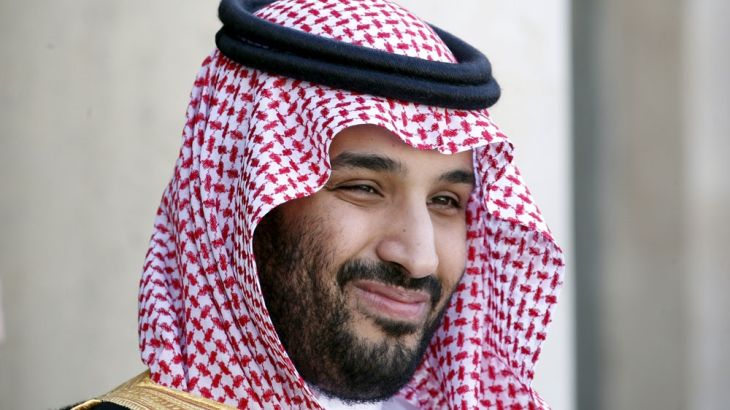Mohammed bin Salman: One year as Saudi crown prince
Saudi crown prince wrapped up eventful first year in his position by combining social reforms with crackdown on dissent.

It has been one year since the appointment of Mohammed bin Salman – known colloquially as MBS – as Saudi crown prince, shaking up Saudi domestic and foreign policies in an unprecedented way.
The 33-year old, described by those around him as ambitious, if not rash, wasted no time in consolidating his power while simultaneously reinventing his image into a reformist and as a symbol of moderate Islam.
Keep reading
list of 4 itemsSaudi Arabia’s Riyadh selected to host World Expo in 2030
Qatar’s emir receives Saudi Arabia’s foreign minister on an official visit
Saudi Arabia’s e-sports looking to nurture its own hit games
Bin Salman is believed to be behind the blockade of Qatar by Saudi Arabia, the United Arab Emirates, Bahrain and Egypt.
The move to cut ties with Qatar was mainly driven by Mohammed bin Salman and the UAE Crown Prince Mohammed bin Zayed Al Nahyan (MBZ), and which seems to have achieved nothing significant other than dividing the Gulf Cooperation Council (GCC).
Two months after being appointed as the world’s youngest defence minister in 2015, bin Salman decided to launch a brutal military campaign in Yemen.
To date the war has devastated Yemen and killed over 10,000 people, turning it into what the UN has described as the world’s worst humanitarian disaster.
Domestically, bin Salman imprisoned dozens of critics and dissidents last September, including peaceful activists, writers, journalists and two prominent Muslim scholars.
The move was condemned by Human Rights Watch as a “complete intolerance toward citizens who speak out for human rights and reform”.
A month later, speaking at a conference in the capital, Riyadh, bin Salman vowed to “eradicate the remnants of extremism very soon”, adding that Saudi Arabia will be “a country of moderate Islam that is open to all religions and to the world”.
Rooting out political corruption
Last November, bin Salman ordered the arrests of hundreds of Saudi princes, high-level businessmen, and government ministers in an anti-corruption probe, which was widely regarded as a political purge of potential rivals.
Those arrested were held at Riyadh’s Ritz-Carlton hotel, and dozens were later released after they had reportedly paid hundreds of millions of dollars in bail.
The crown prince now controls Saudi’s three main security forces and has been wise enough to remain close to the country’s religious establishment in order to appease them, even as he sought to curtail their influence.
The corruption crackdown was endorsed by the Council of Senior Scholars – the kingdom’s chief religious body – and was exceptional in that it sent out a message that the royal family were not immune from facing the law.
Social reform
The efforts of bin Salman for his modernisation attempts have been heralded as a long-awaited and progressive attempt to bring conservative Saudi Arabia into the 21st century – and his largest support base came from his own subjects, 60 percent of whom are under the age of 30.
In January this year, women were allowed for the first time to attend sports stadiums – a venue that was previously entitled to men only. Furthermore, a royal decree was signed to overturn the law that bans women from driving, and greater participation in the public sphere was opened up to women.
Yet this was overshadowed by the recent and ongoing arrests of prominent Saudi feminists and activists who had publicly advocated for gender equality, the right for women to drive, and an end to the male guardianship system.
The activists, which include human rights defenders, were subjected to a vicious smear campaign by the authorities, which labelled them as traitors and accused them of having suspicious contact with foreign entities.
They also face being charged under the country’s 2014 anti-terrorism law, which has been criticised by human rights groups as a tool to crush peaceful political dissent.
Economic modification
The plans for diversifying the kingdom’s economy and dependency on oil were unveiled by MBS two years ago under the banner of Vision 2030, which relies on social reforms and seeks to integrate women in the workforce.
He outlined policies to develop public sectors such as education, tourism and recreation. One such plan is the construction of a hi-tech $500bn economic zone on its north-west coast, extending to Jordan and Egypt.
As decades of economic corruption whittled off billions of dollars from the economy, Vision 2030 has proposed the creation of a sovereign wealth fund and the sale of shares from Saudi Aramco, the state-owned oil corporation – previously an unthinkable act.
To ensure lucrative investments into Saudi Arabia, the crown prince went on an official tour starting from Egypt to Europe and the United States.
He courted officials, celebrities, and influential CEOs and convinced them to sign contract bonds in return for his promise of a modernised country, away from the image of an ultra-conservative theocracy.
Impulsive behaviour
However, rash decisions on the regional front have done the prince no favours. His actions against neighbouring countries such as Yemen and Qatar have resulted in far-reaching geopolitical implications and caused more predicaments than a show of regional strength.
Another example is when Lebanese Prime Minister Saad Hariri announced his forced and bewildering resignation in Riyadh – in the hopes of dealing a blow to Hezbollah, Iran’s ally in Lebanon. Needless to say, that backfired and Hariri rescinded his notice as soon as he touched down in Beirut.
Yet the challenge remains in maintaining a delicate balance between the kingdom’s conservatives and the reform-minded people.
If MBS pushes too hard and causes an upheaval of the social contract too quickly, his legitimacy will be questioned, if not undermined by the conservatives and his rivals.
If he favours them, however, the Saudis on board with reforms could trigger social unrest, potentially placing the kingdom in a quagmire of little transformation and more repression.